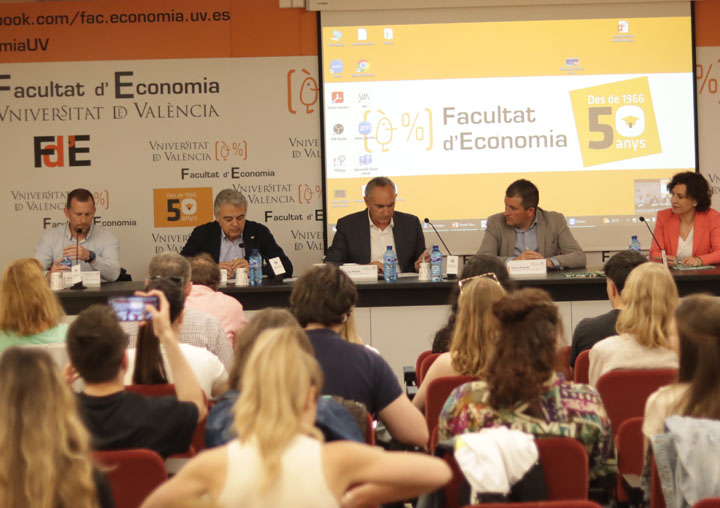Universitat de València, the second university in Spain regarding outgoing erasmus, and the third one regarding incoming erasmus
- Press Office
- January 29th, 2019

Universitat de València is the second university in Spain (behind Granada) regarding outgoing Erasmus students, and the third one regarding incoming Erasmus students. That is what the European Union Annual Report says related the scholar year 2016/17.
In 2017/18, 2,045 Erasmus students came to Universitat de València, and 1,650 went to other countries in Europe. The main destinations were Italy, United Kingdom, Germany and France, in that order. The countries from which more Erasmus students came where the same as above, but in the following order: Italy, Germany, France and United Kingdom.
In total, 48,595 students chose Spain with the aim of studying or having an internship. The second most popular destination was Germany, with 34,497 participants, followed by the United Kingdom, with 31,727 students. Moreover, France was the country which sent more students to other countries, in particular, 43,905, followed by Germany sending 40,959 students, and by Spain sending 40.079.
In 2017, the EU invested a record quantity, 2,600 billion in the Erasmus+ programme, which represented an increase of the 13% in comparison with 2016. This inversion allowed to offer more opportunities than ever to the youth. The numbers show that the Erasmus+ Programme follows the right path to achieve its purpose of supporting the 3.7% of UE students from 2014 to 2020.
The report also highlights that the Programme is increasingly accessible to people coming from disadvantaged background as well as it is more accessible to smaller organisations.
In 2017, Erasmus+ gave support to a 800, 000 people, a record number, to study, build up themselves or volunteer in foreign countries, what represents an increase of the 10% in comparison to 2016.
The support to the Programme have never been so strong. During the recent campaign undertaken in 2017 to celebrate the 30th anniversary of the Erasmus Programme, more than 750, 000 people participated in the events in 44 countries, underlining the way in which Erasmus+ and its precedents allow youth to develop their skills and to learn what is feeling part of Europe.
Erasmus+ and its precedents are among the most successful programmes of the European Union. Since 1987, they have offered opportunities, especially to the youth, to broaden experience by moving to a foreign country. The current Erasmus+ Programme, which is being developed between 2014 and 2020, counts with a 14,700 billion budget and it will offer to the 3,7% of the students in the EU the opportunity to learn, build up themselves, acquire work experience and volunteer in foreign countries. The geographic area that it covers have grown from 11 countries in 1987 to 33 nowadays (the 28 European Union Member States apart from Turkey, the former Yugoslav Republic of Macedonia, Norway, Island and Liechtenstein). For the scholar year 2019/20, it is also planned the participation of Serbia. Moreover, the Erasmus+ Programme has widened mobility forms to countries all around the world.
More information:
File in: Erasmus Estudis , Programa internacional , Erasmus Pràctiques















